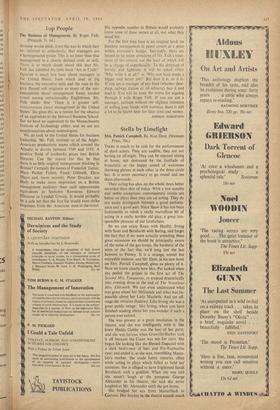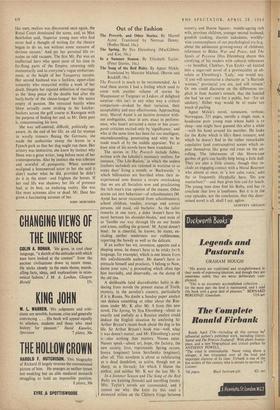Stella by Limelight
THERE is much to be said for the performances of dead actors. They are audible, they are not having an off-night. They can be enjoyed sitting at home, not destroyed by the fusillade of bronchitis or the happy sound of waitresses throwing glasses at each other in the dress circle bar. It is never necessary to go round and see them afterwards.
Their acting has also, on the whole, been better recorded than that of today. With a few notable and noble exceptions contemporary critics are better on plays than they are on acting. They do not easily distinguish between a good perform- ance and a good part. Since Shaw it has not been fashionable to relish a really marvellous bit of acting in a really terrible old play, a great irre- sponsible pleasure of our forefathers.
So we can enjoy -Kean with Hazlitt, Irving with Scott and Bernhardt with Baring, and forget the fact that if we were actually attending these great occasions we should be principally aware of the noise of the gas lamps, the hardness of the seats or the fact that we'd long lost the last hansom to Putney. It is a strange, unreal but enjoyable pastime, and Mr. Dent, in his new book on Mrs. Patrick Campbell. gives us plenty of it. Now we know clearly how Mrs. Pat looked when she peeled the grapes in the first act of The Second Mrs. Tanqueray, or erupted dramatically into evening dress at the end of The Notorious Mrs. Ebb:smith, We can even understand what was great about her Melisande and what was im- possible about her Lady Macbeth. And yet off- stage she remains shadowy. Like Irving she was a great public image: like Irving, when you have finished reading about her you wonder if such a person ever existed.
She was present at a great revolution in the theatre, and she was intelligently with it. She knew Hedda Gabler was the best of her parts, and she was furious when Granville-Barker took it off because the Court was not for stars. She began life looking like the Blessed Damozel with a dark bird's-nest of hair and Pre-Raphaelite eyes; and ended it, as she says, resembling Musso- lini's mother. She made funny remarks, often while acting in plays which failed to hold her attention. She is alleged to have frightened Sarah Bernhardt with a goldfish. When she was told she musn't laugh at the pompous George Alexander in his theatre, she said she never laughed at Mr. Alexander until she got home.
She bridged her era from Maeterlinck to Cocteau. Her heyday in the theatre sounds much
like ours, realism was discovered once again, the Royal Court dominated the scene, and, as Max Beerbohm said, 'Superior young men who had never had a thought of writing for the theatre began to do so, not without some measure of devious success.' And yet her personal life re- mains an odd vacuum. The first Mr. Pat was an ineffectual hero who spent most of his time in far-flung parts of the Empire, returning only momentarily and to everyone's vague embarrass- ment, at the height of her Tanqueray success. Her second husband was a feckless, upper-class nonentity who remarried within a week of her death. Despite her reputed definition of marriage as the 'deep peace of the double bed after the hurly-burly of the chaise-longue' her life seems empty of passion. She retreated hastily when Shaw actually came striding in his knicker- bockers across the golf course at Ramsgate with the purpose of finding her and, as Mr. Dent puts it, consummating his love.
She was self-centred, difficult, politically un- aware. At the end of her life, an old fat woman in woolly trousers fleeing the Germans, she made the authorities sweep the leaves in a French park so that her dog might run there. Her artistry was instinctive, she knew by instinct why Ibsen was a great writer, long before most of her contemporaries. Also by instinct she was tolerant and scornful of pomposity. When someone maligned a homosexual actor to her she said it didn't matter what he did, provided he didn't do it in the street—and frighten the horses. If her real life was shadowy her life of pretence had, at its best, an enduring reality. She was like most actresses alive or dead. Mr. Dent has given, a fascinating account of her.
JOHN MORTIMER















































 Previous page
Previous page